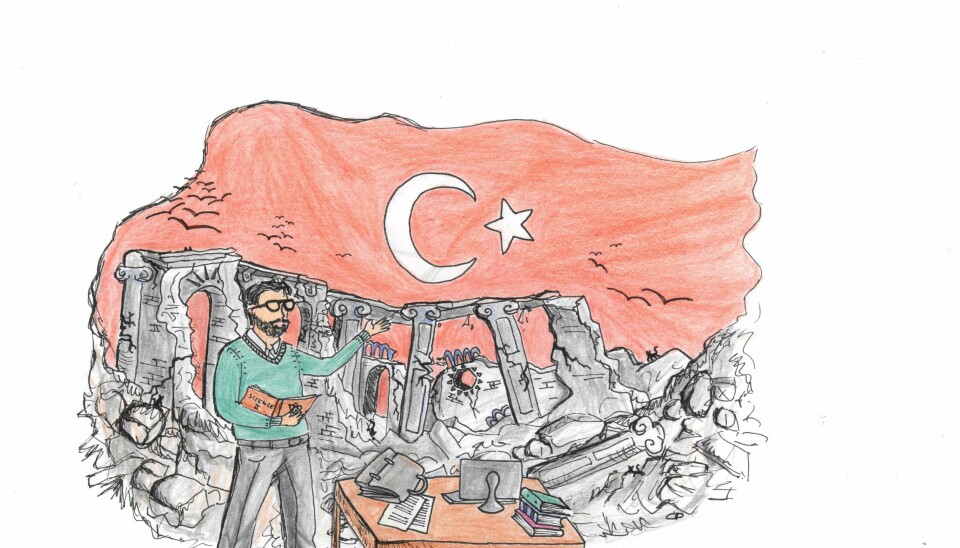ANALYSIS EARTHQUAKES TURKEY AND SYRIA
‘In Turkey, for no one, life just goes on’

Late February, higher education in Turkey restarted in digital form. A month after the violent earthquakes in the southeast, the country is still licking its wounds. 'Everything that had significance is gone.'
Turkish student Helin was in northern Turkey when the earthquakes occurred. Helin is pursuing a master’s degree in Social and Cultural Anthropology at KU Leuven and was visiting her parents during the midterm break. 'At that moment, I couldn’t fathom how bad things were in the southeast,' she says. In Turkey alone, more than 40 000 victims would eventually be reported.
Belgian-Turkish Music Therapy student Emine had just returned to Leuven on the 6th of February after a visit to the affected region around Antakya. 'I had to give a bachelor paper presentation in Leuven, otherwise I would have stayed there longer.'
'The first thing we do when we arrive in Turkey is to take in the smell. But now the city smells like death.'
The day after the earthquake, Emines' parents left for Turkey. 'A lot of friends and family were lying under the rubble,' she says. In the end, her parents helped bury hundreds of people. During that time, Emine was at home with her two brothers. 'We barely had any contact with our parents and I missed them, but it felt weird to miss them while my cousin had lost her parents, brother and sister.'
Helin too was living through a period of uncertainty. 'I didn’t want to overwhelm my friends in the affected regions with questions, because I knew they were going through an awful lot, but through others I managed to find out that they were OK.'
The smell of Antakya
Helin returned from Turkey before the start of the second semester. 'It was good to be back, although sometimes I feel guilty for being here as well.' Emine also suffers from feelings of guilt sometimes. 'Then again, I feel like especially now I have to keep studying and living for the people who can't anymore.' Emine’s cousin had told her that she was going to study sociology just the week before she lost her.
Both students struggle to grasp the magnitude of the disaster. 'There is no one who didn't lose family members or their home,' Emine said. ‘Everything that had significance is gone.' She talks about the smell of Antakya specifically: 'The first thing we do when we arrive in Turkey is to take in the smell. But now the city smells like death.'
Especially confronting for Emine were the maps that appeared in the media just after the earthquakes. On those maps, Antakya was not marked as an affected area. Afterwards, it turned out that contact with the city was not possible at first. 'There were so many people lying under the rubble and hardly any help could reach them.'
'The fear of earthquakes is deeply ingrained: we feel like we are walking on eggshells.'
Now, for Emine, it comes down to helping the victims as best as possible, but also to committing to the discussion around building safety. 'Everything lies in front of us now, so this is the time to address the issues before it's too late again.'
Online education
The earthquakes happened right between the two semesters of the academic year in Turkey, during a time when some students were still taking exams. Eventually, the second semester of higher education started with a delay on the 20th of February, by means of online classes.
Helin’s father started teaching on-line, and Emines aunt and uncle are continuing the work on their doctorates digitally. Turkey’s highest education authority has announced that this system will be re-evaluated in early April. A special student status has been introduced as well, allowing students to take courses at a university where they are not enrolled.
Walking on eggshells
Although the biggest earthquakes happened a month ago now, the disaster is not over yet, as Helin points out. 'For the people in Turkey, this is just the beginning: everyone has lost people and houses are not yet standing upright.' The earthquake has also rekindled a collective fear. 'The fear of earthquakes is deeply ingrained: we feel like we are walking on eggshells.'
'The disaster confronted me with the fact that I am very far away from my parents'
Most of Helin's friends live in Ankara, Izmir and Istanbul: cities that were spared last month but that are equally situated in earthquake-prone areas. 'My parents also live close to a fault line,' she explains. 'The disaster confronted me with the fact that I am very far away from them.' Emine has lost six people in her close family circle, but is the most touched by the state her parents were in when they came back from Turkey. 'When they arrived in Turkey, it was still full of chaos: they have seen so much.' Emine hopes that they will manage to find a way of living with those experiences.'They are going through dozens of grief processes at the same time. And yet here, in a way, their lives just go on. ‘That exactly is what makes it all so painful: because in Turkey, for no one, life just goes on.'









